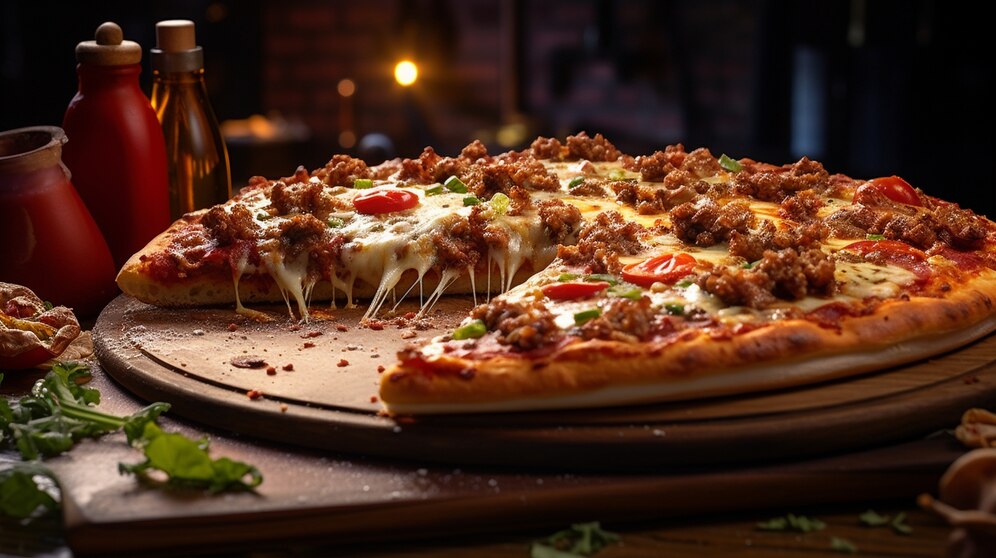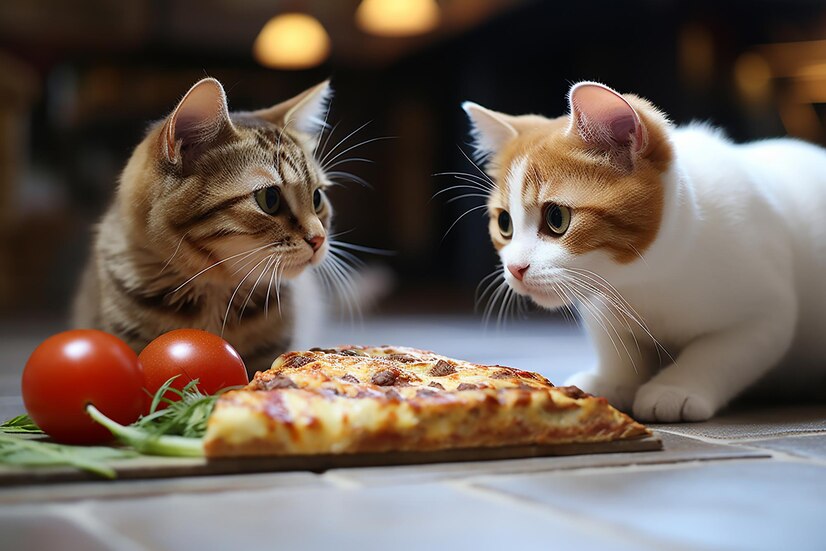Have you ever been enjoying a slice of pizza and noticed your cat looking up at you, seemingly curious or even eager to take a bite? Pizza is a beloved comfort food among humans, but it’s natural to wonder if it’s suitable for your feline friend. Let’s explore what happens if your cat eats pizza, if certain pizza ingredients like cheese, sauce, bread, and toppings are safe, and some essential precautions to ensure their health.
What Happens if My Cat Eats Pizza?
If your cat has managed to eat a small piece of pizza, don’t panic. In small amounts, pizza might not cause severe harm, but it’s not a recommended treat. Pizza typically contains ingredients that are not ideal for cats, like cheese, bread, and pizza sauce, each of which could cause digestive issues. Read Can Cats Eat Bananas?
Pizza often contains high levels of fat, salt, and sometimes toxic ingredients for cats, such as garlic and onions, which can potentially lead to more severe issues like gastrointestinal upset and lethargy. Read Can a Dog Get a Cat Pregnant?
According to experts at PetMD, foods high in salt and fat can lead to long-term health problems in cats, including obesity and heart issues . Read Can cats see colors?
Can Cats Have a Piece of Pizza?
While a small piece might not be an emergency, it’s best to avoid offering pizza to your cat altogether. The ingredients used to make pizza are not suitable for cats and could contribute to a range of health concerns, from short-term discomfort to more serious, long-term issues.

For example, cheese can be difficult for many cats to digest due to lactose intolerance, and dough is typically full of refined carbohydrates that don’t provide necessary nutrients for cats. Pizza crust can contain oils and flavorings that aren’t healthy for cats. Read 9 Reasons Why Do Cats Hate Water?
As VetStreet notes, even small indulgences can lead to poor eating habits and nutrient deficiencies in cats, as pizza lacks essential vitamins and minerals . Read Dehydration in Cats: Symptoms, Causes, & Treatment
Can I Feed a Stray Cat Pizza?
If you encounter a stray cat, pizza isn’t the best food to offer. Cats, including strays, require a diet high in protein with balanced fats and carbohydrates, which pizza does not provide.
Stray cats are often hungry, but a slice of pizza may cause digestive problems rather than helping. Instead, try feeding them a small amount of cat food, canned tuna in water (no oil), or boiled chicken, which are much safer options and better suited to their dietary needs. Read Can Cats Eat Onions? A Deadly Threat
Feeding practices, according to the ASPCA, should always prioritize nutrition-dense, species-appropriate foods to support a cat’s health . Read Why Does My Cat Follow Me To The Bathroom
Can Cats Eat Pizza Cheese?
Cheese might seem harmless, but most cats are lactose intolerant. While some cats can handle small amounts of cheese without issues, most will experience gastrointestinal discomfort, which can include symptoms like gas, diarrhea, and stomach cramps. If i discuss further, pizza cheese is often processed and may contain added salts, fats, and preservatives that can lead to an upset stomach or other health issues. Read Why Is My Cat Not Drinking Water? Causes, and Solutions
The Cummings Veterinary Medical Center at Tufts University emphasizes that lactose intolerance is common in cats and that dairy-based treats should be limited or avoided . Read Can Cats Eat Popcorn?
Can Cats Eat Pizza Sauce?
Pizza sauce may contain several ingredients that are harmful to cats, such as onions and garlic. These ingredients are toxic to cats and can cause hemolytic anemia, a condition where red blood cells are destroyed faster than they can be made, leading to symptoms such as lethargy, weakness, and vomiting. Even in small amounts, pizza sauce can be risky, as cats are more sensitive to these ingredients than humans. Read Can Cats Eat Cheese?
The Pet Poison Helpline notes that even small amounts of onions or garlic can be dangerous to cats, so it’s best to keep pizza sauce out of their reach .
Can Cats Eat Pizza Bread?
Pizza dough, while not immediately harmful, is made of refined flour, which is not beneficial for cats. It’s high in carbohydrates, which cats don’t metabolize well. Unlike humans, cats are obligate carnivores, meaning they derive most of their energy and nutrients from animal protein. Consuming bread may contribute to weight gain and other health problems if it becomes a regular treat. Read Can Cats Eat Pineapple?
If pizza dough is raw, it can be hazardous. The yeast in uncooked dough can ferment in a cat’s stomach, producing alcohol and causing bloating, discomfort, or even life-threatening alcohol poisoning. Read Can Cats Eat Cherries?
The ASPCA advises against feeding cats raw dough due to the risks associated with yeast fermentation .
Can Cats Eat Pizza Rolls?
Pizza rolls are typically made with processed ingredients, including artificial preservatives, salts, and fats, which are not suitable for cats. Like pizza, pizza rolls can contain ingredients toxic to cats, like garlic or onion powder, as well as processed cheese and sauce. Ingesting these ingredients may lead to gastrointestinal upset or, in worse cases, toxicity. Read Can Cats Eat Eggs?
Pizza rolls often contain excessive fats and calories, which could lead to weight gain and increase the risk of health issues in cats if consumed regularly. Read Can Cats Eat Oranges?
As PetMD points out, it’s best to avoid feeding processed foods to cats, as they do not provide the necessary nutrition and can lead to obesity and other health issues .
Why Pizza Ingredients Are Not Suitable for Cats
Cats’ bodies are not designed to process many ingredients commonly found in human foods. High-fat foods, salty snacks, and processed treats are not only difficult for cats to digest but can also lead to obesity, high blood pressure, and other health issues over time. Additionally, ingredients such as garlic, onion, and certain spices can be toxic and should be strictly avoided. Read Can Cats Eat Yogurt?
For more information on foods that are toxic to cats, check out the ASPCA’s comprehensive list of harmful foods .
Healthier Alternatives for Cats
Instead of pizza, consider providing treats specifically made for cats. Many pet stores offer a variety of cat-safe treats that are high in protein and free from harmful additives. Homemade treats, such as boiled chicken or small amounts of plain cooked fish, can also be a nutritious choice for cats, satisfying their cravings without risking their health.
Conclusion
While it might seem harmless to let your cat nibble on pizza, it’s generally best to avoid it. Pizza contains ingredients that are not suitable for a cat’s digestive system, and some can even be toxic.
Further readings
Can Cats Eat Garlic? The Risks You Need to Know



